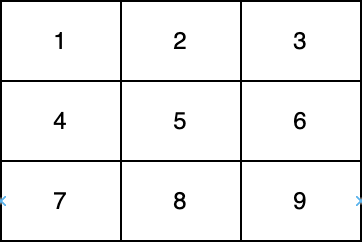LeetCode-in-Java
2614. Prime In Diagonal
Easy
You are given a 0-indexed two-dimensional integer array nums.
Return the largest prime number that lies on at least one of the diagonals of nums. In case, no prime is present on any of the diagonals, return 0.
Note that:
- An integer is prime if it is greater than
1and has no positive integer divisors other than1and itself. - An integer
valis on one of the diagonals ofnumsif there exists an integerifor whichnums[i][i] = valor anifor whichnums[i][nums.length - i - 1] = val.

In the above diagram, one diagonal is [1,5,9] and another diagonal is [3,5,7].
Example 1:
Input: nums = [[1,2,3],[5,6,7],[9,10,11]]
Output: 11
Explanation: The numbers 1, 3, 6, 9, and 11 are the only numbers present on at least one of the diagonals. Since 11 is the largest prime, we return 11.
Example 2:
Input: nums = [[1,2,3],[5,17,7],[9,11,10]]
Output: 17
Explanation: The numbers 1, 3, 9, 10, and 17 are all present on at least one of the diagonals. 17 is the largest prime, so we return 17.
Constraints:
1 <= nums.length <= 300nums.length == numsi.length1 <= nums[i][j] <= 4*106
Solution
public class Solution {
public int diagonalPrime(int[][] nums) {
int i = 0;
int j = nums[0].length - 1;
int lp = 0;
while (i < nums.length) {
int n1 = nums[i][i];
if (n1 > lp && isPrime(n1)) {
lp = n1;
}
int n2 = nums[i][j];
if (n2 > lp && isPrime(n2)) {
lp = n2;
}
i++;
j--;
}
return lp;
}
private boolean isPrime(int n) {
if (n == 1) {
return false;
}
if (n == 2 || n == 3) {
return true;
}
int i = 2;
while (i <= Math.sqrt(n)) {
if (n % i == 0) {
return false;
}
i++;
}
return true;
}
}

